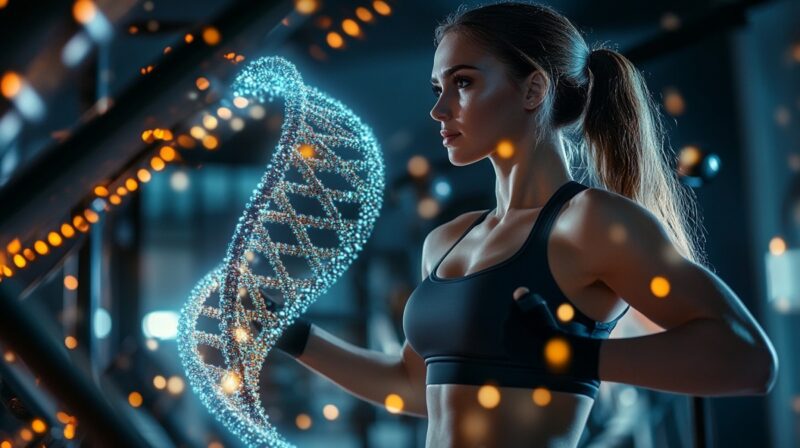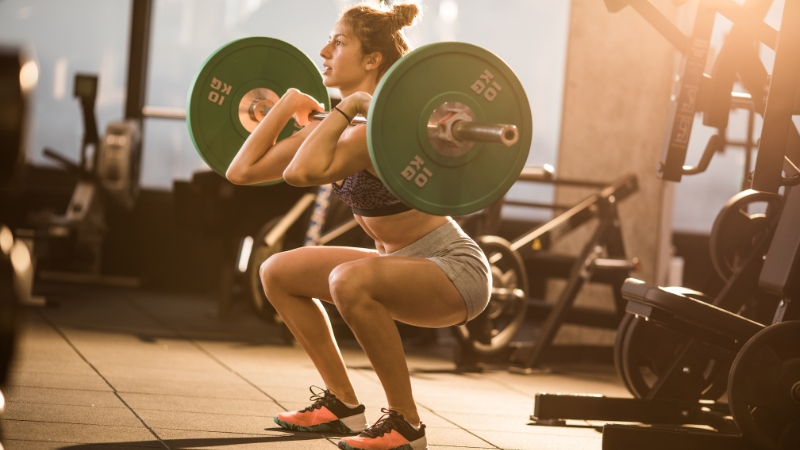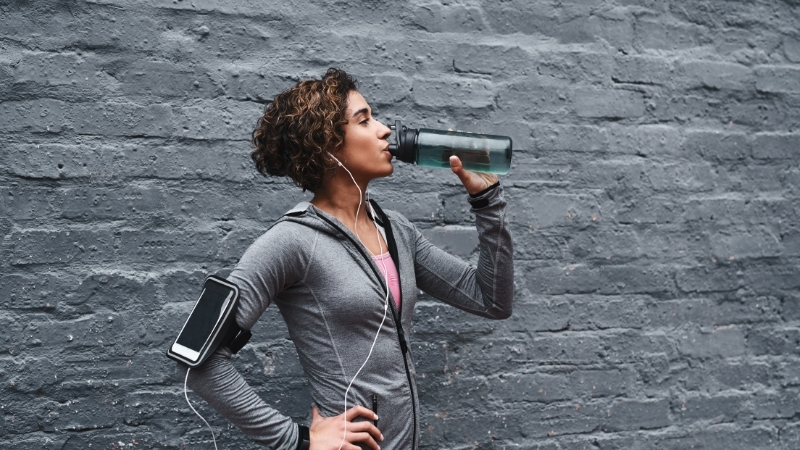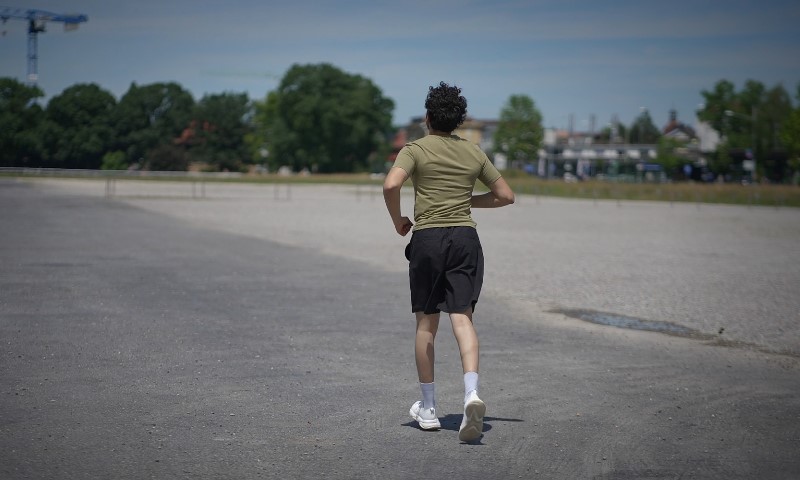
Share Post:
You’ve probably noticed that even with the same workout routine, some people see results faster than others.
It’s not just about effort; your genetics play a huge role in how your body responds to exercise.
In this article, we’ll explore how your DNA can influence everything from muscle gain to endurance, and how understanding this can help you optimize your fitness routine.
Table of Contents
ToggleHow Genes Affect Muscle Growth
It can be a game changer when it comes to how your muscles respond to your workouts. It’s not just about lifting weights; it’s about what’s happening at a cellular level, influenced by your DNA.
The Role of Muscle Fibers

There are two main types of muscle fibers in your body: slow-twitch and fast-twitch. Your genetic makeup decides in part how many of each you have. If you’re blessed with more fast-twitch fibers, you might find yourself excelling at explosive activities like sprinting or weightlifting.
Conversely, more slow-twitch fibers could make you better at endurance activities like long-distance running.
Markers for Muscle Hypertrophy
Certain genes are known to influence muscle hypertrophy, or the increase in muscle size. One of these genes is ACTN3, often called the “speed gene.”
If you have this gene, you might find muscle growth comes a bit easier. But if you’re missing it or have a variant, you might need to work a bit harder or differently.
The Influence of Hormones
Genetics also affect how your body uses hormones like testosterone, which is crucial for muscle growth. Some people naturally produce more of this hormone, giving them a slight edge in muscle development. Others might need to tweak their training or diet to see similar gains.
Consulting a Medical Geneticist
If you’re really serious about understanding your body’s response to exercise, talking to a medical geneticist can be enlightening.
They can provide insights into your genetic profile that might explain why you’re not seeing the muscle gains you expect despite your dedication.
Environmental vs. Genetic Factors

While genetics set the stage, remember that training, diet, and rest play massive roles too. Even if genetics aren’t in your favor for muscle growth, consistent hard work can still yield impressive results. It’s about finding the balance that works for your body.
Endurance Can Also Be Related to Genetic Factors
Some folks can run for miles without breaking a sweat, and genetics play a big role here. Genes like ACE influence how efficiently your heart pumps blood and how well your body uses oxygen.
If you’re genetically predisposed to endurance, you might find marathon training a bit easier.
Training for Endurance
- Consistency is Key: Even if you’re not a natural, regular training can improve your endurance.
- Variety in Workouts: Mixing high-intensity intervals with longer, steadier runs can help.
- Recovery: Listen to your body; recovery is as important as the workout itself.
Genetic Markers
Genes like PPARA can affect how your body uses fat for energy, which is vital for endurance athletes. Knowing your genetic profile might help you tailor your training to get the most out of your body.
Body Composition
Your genetic code can influence how much body fat you carry and where it’s stored. Some people naturally have a leaner build, while others might struggle with fat in certain areas.
Influence on Metabolism
- Basal Metabolic Rate (BMR): Your genes can determine how many calories your body burns at rest.
- Insulin Sensitivity: How your body responds to insulin can be genetically influenced, affecting fat storage.
Lifestyle is still the Key
While genetics set a baseline, diet and exercise can significantly alter body composition. It’s not all about the genes; lifestyle choices can make a big difference.
Injury Risk and Genetic Predisposition
Some of us are more prone to injuries due to genetics. For instance, certain collagen genes can make your tendons and ligaments less resilient.
Common Risk Factors

Joint Laxity: Some people have naturally looser joints, increasing injury risk.
Bone Density: Genetic factors can affect how strong your bones are, influencing fracture risk.
Understanding your genetic risks can lead to better prevention strategies, like focusing on strength training to support joints or specific exercises to avoid common injuries in your genetic profile.
Response to Different Types of Exercise
Not everyone responds to exercise in the same way. Some might see quick results from strength training, while others might excel in yoga or dance.
Genetic Predictors of Exercise Response
- VO2 Max: This measure of aerobic fitness can be influenced by genes.
- Muscle Fiber Type: As mentioned, this can dictate your natural inclination towards certain exercises.
Personalized Nutrition
When it comes to fueling our bodies, one size does not fit all. Genetic variations play a crucial role in how we respond to different nutrients, which can significantly influence our dietary needs, especially in relation to fitness goals.
Nuances in Nutrient Processing

- Carbohydrates: Genetic predispositions can dictate how effectively your body uses carbs for energy. Some individuals might experience energy spikes followed by crashes, while others maintain consistent energy levels, indicating different carbohydrate management strategies might be necessary.
- Protein: The efficiency with which your body utilizes protein for muscle repair and growth can vary. Genetic makeups can mean some require higher protein intakes to achieve similar muscle-building results as others.
- Fats: Your genetic profile can influence your body’s ability to process different types of fats. Some genes are linked to better outcomes with diets higher in certain fats like omega-3s, while others might find they need to limit saturated fats.
Customizing Your Diet
- Genetic Testing: While not accessible to everyone, genetic testing can provide insights into how your body interacts with various foods, helping tailor your diet for optimal health and performance.
- Personal Experimentation: Without relying on genetic tests, you can still personalize your diet by observing how different foods affect your energy levels, recovery, and overall well-being. This might mean adjusting the balance of macronutrients or choosing specific food types based on personal response.
- Supplements: Sometimes, genetics can mean you’re predisposed to deficiencies or poor nutrient absorption. Supplements can be considered to bridge these gaps, particularly for nutrients like iron or Vitamin D, which can be crucial for athletes.
FAQs
Can genetics limit how strong I can get, or is it all about training?
Genetics set a baseline for things like muscle fiber type and hormone levels, which can influence your strength potential. However, with dedicated training, nutrition, and recovery, you can significantly exceed what might be considered your genetic limit. It’s not just about how strong you can be genetically; it’s also about how much you’re willing to work for it.
How do genetics affect recovery time from exercise?
Your genetic makeup can influence recovery speed by affecting inflammation, muscle repair processes, and even how your body responds to sleep and rest. Some genetic profiles might lead to quicker recovery, while others might need more deliberate recovery strategies like extra sleep, nutrition, or specific therapies.
Can my genetic profile influence my motivation to exercise?
Yes, there are genetic factors that can impact traits like motivation, discipline, and even the psychological reward from exercise. Genes can influence neurotransmitter levels like dopamine, which plays a role in motivation and enjoyment of activities, including exercise.
Are there genes that influence how much we sweat during workouts?
Indeed, genes can affect thermoregulation, including how much you sweat. Variations in genes like those coding for aquaporins (water channels in cells) can mean some people sweat more or less than others, which can impact how they thermoregulate during exercise.
Can genetics explain why some people get “runner’s high” while others don’t?
The experience of “runner’s high” involves endorphins and endocannabinoids, and genetics can play a role in how these chemicals are released and perceived in the brain. Some individuals might have genetic variations that lead to a more pronounced or less noticeable “high” from running or other forms of exercise.
The Bottom Line
Your genes do play a significant role in how your body responds to exercise, affecting everything from muscle growth to endurance, injury risk, and even how you process nutrients. However, genetics are only part of the equation.
With the right training, nutrition, and lifestyle choices, you can optimize your fitness outcomes, regardless of your genetic predispositions.
Related Posts:
- Resistance Band Arms, Abs, and Booty Workout - 10…
- Even Small First Results in A Gym that Only You See…
- Morning Swimming Routines for Maximum Results: How…
- Is Your Workout Causing Your Acne? Here's How to Stop It
- Kettlebell Ab Workout - 5 Core Workout to Engage Core
- Why Exercising on Sand Enhances Your Workout - 5 Key…














